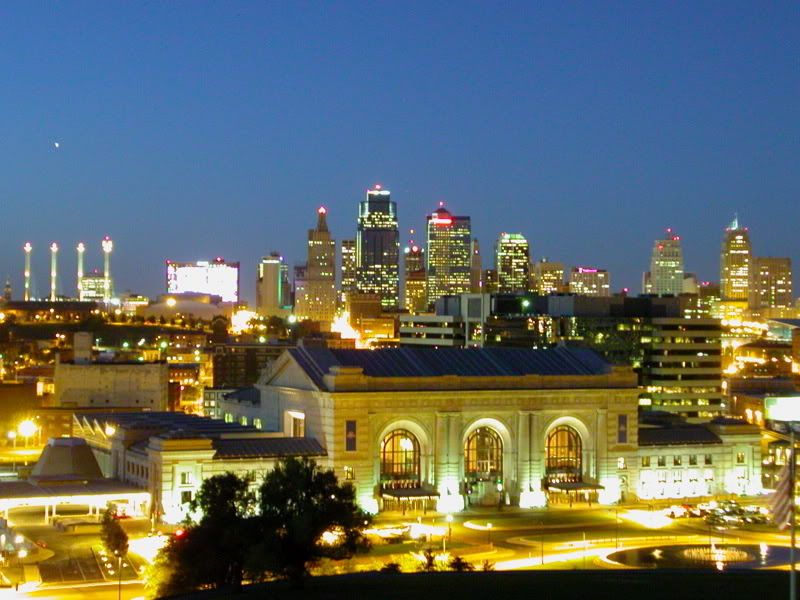As writers, an enormous weight is on us to creatively build a world our readers can believe in. It doesn't matter whether it's the town you live in now, a futuristic alien world, on 1920s Chicago, our responsibility is to convey what surrounds our characters and how it affects them.
Personally, I've always found description a difficult thing. I don't like it, so I tend to be a minimalist. However, when I picked up a book not too long ago that took place in MY town (Kansas City), I was almost as interested to read the book for the plot as I was to see how the author (a fellow Kansas Citian) described our fair metropolitan sprawl. This sudden awareness of setting has made me a bit more open to the fact that I need to be more conscious of the world building aspects in my own novels.
description a difficult thing. I don't like it, so I tend to be a minimalist. However, when I picked up a book not too long ago that took place in MY town (Kansas City), I was almost as interested to read the book for the plot as I was to see how the author (a fellow Kansas Citian) described our fair metropolitan sprawl. This sudden awareness of setting has made me a bit more open to the fact that I need to be more conscious of the world building aspects in my own novels.
While most of my writings have been present day stories set in my own town or region, my recent foray into the world of science fiction has definitely made me aware that there's more to world building than meets the eye. All of a sudden, I'm having to think what life will be like in the 22nd Century--not just hovercraft and other technology,  but the political structure of the world, relations between people, slang that could be used, the types of medical procedures that may be done, all kinds of things I wouldn't have thought about otherwise. I can see, too, that the same would be the case in reverse if I were to be writing a historical novel.
but the political structure of the world, relations between people, slang that could be used, the types of medical procedures that may be done, all kinds of things I wouldn't have thought about otherwise. I can see, too, that the same would be the case in reverse if I were to be writing a historical novel.
Since working on 'Cora's Song', I've come up with some thoughts to help you as a writer more succinctly build your own world--even if it's a place you live right now.
- Remember all the senses: Smell, Sight, Touch, Taste, Auditory. Don't lack in any of them to help give your reader a better sense of the world they find themselves in.
- Consider how the climate may be different. If you're dealing with semi-recent history (post 1880s) try to check climatological data to backup the weather your characters experience. If writing in the future, did Al Gore's theory of global 'climate change' really occur, or was it just a bunch of hogwash?
- Describe how to do something foreign to the reader. Perhaps they've never cleaned a Revolutionary War-era musket. If it's in the future, if teleportation is a viable option, how does that feel to your character?
- How have laws changed? For the better? For the worse? What makes them different in your story than they are today?
- What's different about medical technology?
- How about male/female relations? Race relations?
- Religion and religious practices.
- How materials are used. Do the people recycle everything? Are there ways to utilize what we'd now consider trash in the future? In the past, how did people dispose of trash (or WAS there a lot of trash?)
- Food and drink differences.
- Fashion.
- Transportation.
- Entertainment.
- Living arrangements.
Additional reading:
Wordplay:
Good Writers are So Lazy...
Details: Bringing Fiction to Life
Color Me Vivid
Until next time,

P.S., You may remember in one of my last posts, I mentioned I was considering participating in NaNoWriMo. Well, I did decide to join up, and you can track my progress in the column on the left side of the screen! I got a bit behind due to having a virus and being in bed for 2 days (with my brain completely fogged over) but I'm way ahead of the curve still. My project, tentatively titled 'Beyond Dead', is really coming along. If you'd like to read a brief synopsis and excerpt, go to my profile at NaNoWriMo.org and select the 'Novel Info' tab. I'm very excited about this project and where it's taking me! Thanks, L.S.















